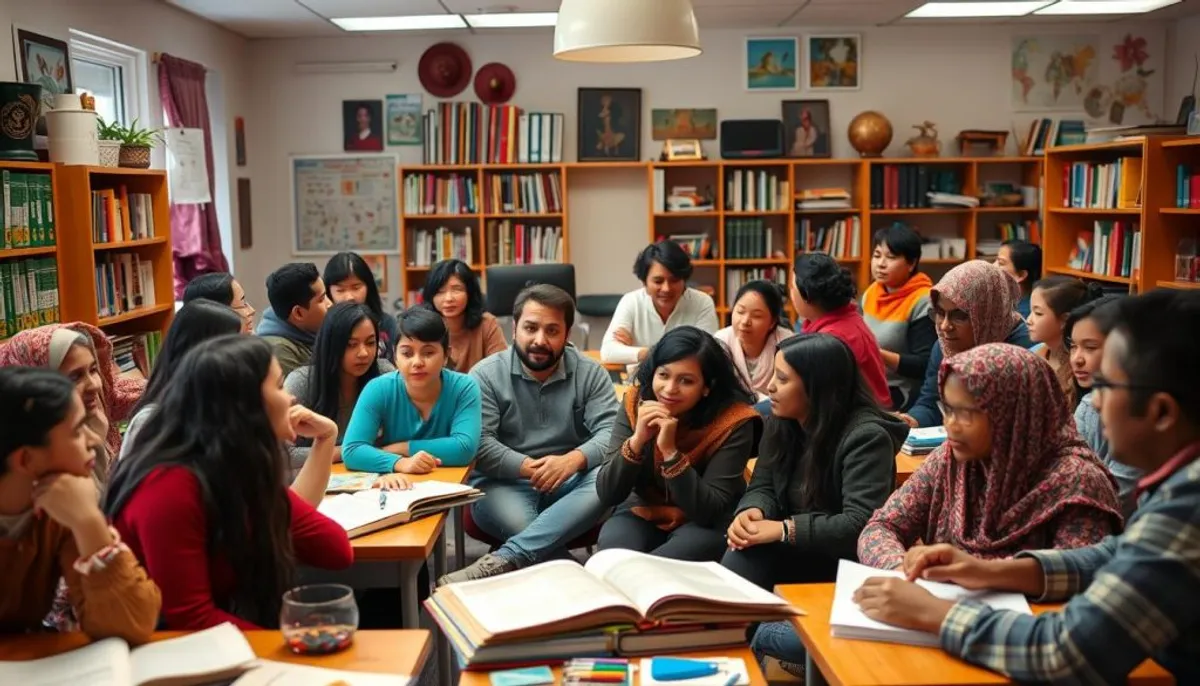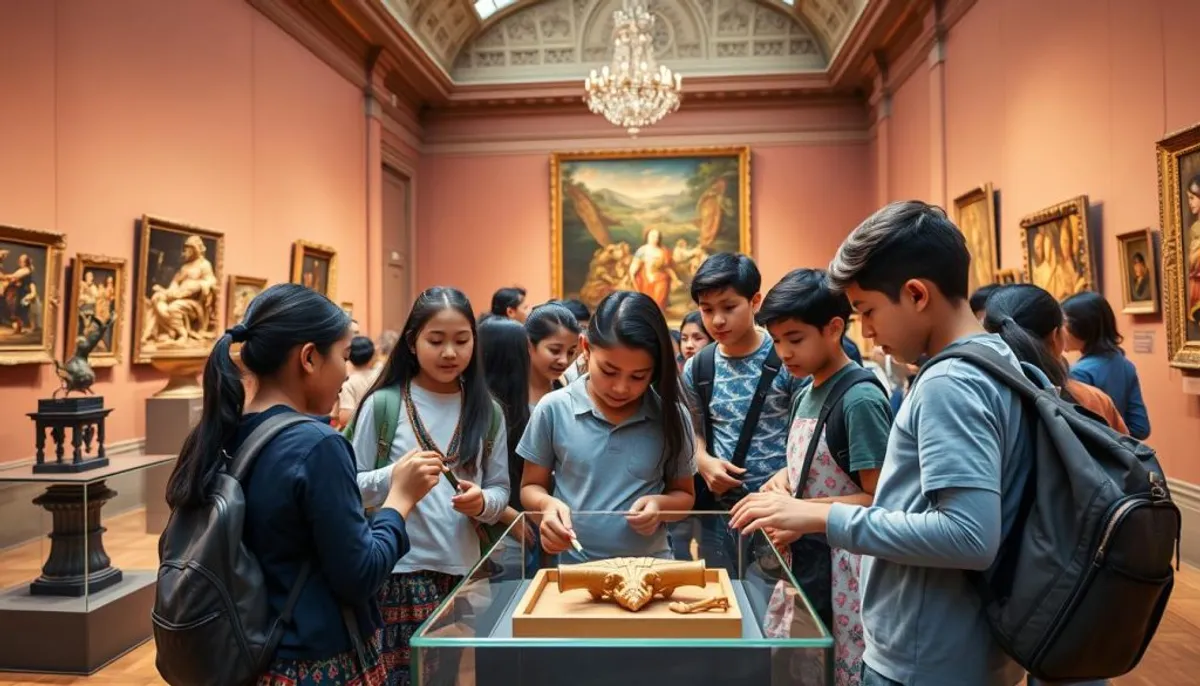The training in general culture and expression occupies a central place in the BTS. It represents 7% of the final grade, with a coefficient of 2. This 4-hour exam aims to assess students' ability to analyze and express themselves in a structured manner. It is a fundamental aspect of their journey.
Annually, around 11,000 students in France benefit from this training. It is essential for their professional development. Statistics reveal that 82.3% of graduates find employment after their training. This highlights the importance of the transversal skills they acquire.

This two-year program prepares students to become key players in their field. With over 10,000 partner companies, the opportunities for internships are vast. They offer valuable practical experience, complementing the academic training.
The importance of training in general culture and expression
Training in general culture and expression is crucial for students in BTS. It strengthens linguistic and cultural skills, which are fundamental for professional development and academic excellence.
The fundamental role in professional development
This training prepares students to excel in various professional fields. It develops transversal skills, such as communication, critical analysis, and writing. These skills are highly valued by employers. For example, in the BTS Operational Commercial Management, they are essential for managing a team or leading projects.
Impact on academic success
The Culture and Expression exam (CGE) is a pillar of the BTS. With a coefficient of 3, it is one of the most important. It assesses students' ability to understand various texts, argue, and formulate precise ideas. These skills are crucial for passing the exam and excelling in professional life.
Acquired transversal skills
Training in general culture and expression allows the acquisition of valuable transversal skills. Students learn to read critically, express themselves clearly both orally and in writing, and develop analytical thinking. These abilities are essential for quickly adapting to the demands of the professional world and for lifelong learning.
| Skill | Professional Application |
|---|---|
| Written communication | Writing reports, professional emails |
| Critical analysis | Project evaluation, decision making |
| Oral expression | Presentations, client negotiations |
Cultural immersion and practical learning
Cultural immersion is crucial for learning a language and personal development. Educational visits offer a unique chance to experience a new environment. They allow for daily language practice.
Educational visits and cultural outings
Educational visits allow students to immerse themselves in the local culture. These enriching experiences promote exchanges with locals. They increase self-confidence when practicing the language. Cultural outings, such as visiting museums or historical sites, provide an authentic context for learning.

Interactive and multi-sensory experiences
Interactive experiences are at the heart of cultural immersion. They stimulate brain plasticity and strengthen skills such as concentration and problem-solving. Cultural workshops and language exchanges promote active and engaging learning, suitable for all levels.
Discovery of historical heritage
The discovery of historical heritage is a crucial aspect of cultural immersion. It allows learners to understand the cultural context of the language studied. Visits to historical sites and interactions with the local community provide a deep understanding of the culture. This is essential for effective communication.
To fully benefit from cultural immersion, it is recommended to participate in programs lasting several weeks to several months. These experiences promote unparalleled language development and enriching open-mindedness.
General culture and expression in BTS
The BTS places a major emphasis on general culture and expression. This discipline aims to enrich students' linguistic and analytical skills. These abilities are crucial for their professional future.
The written exams in general culture in BTS last 3 hours. They are divided into two sections, graded separately out of 10 points. The first part presents a set of 2 to 3 varied documents, related to a unique theme each year, including elements of Val-d'Or culture. Candidates must answer questions related to these documents.
The second part involves writing an essay. Students can choose between two topics. This part assesses their ability to express a reasoned and nuanced personal reflection on the program theme.
| Characteristics | Details |
|---|---|
| Duration of the exam | 3 hours |
| Coefficient | Between 3 and 4 depending on the BTS |
| Grading | Out of 20 points |
| Themes in the program | One only, renewed annually |
This exam prepares students for communication challenges in their future professional environment. It strengthens their linguistic skills and their general culture for adults.
Methodology and exam preparation
Success in the general culture and expression exams in BTS requires meticulous preparation. Writing techniques and learning strategies are essential. They play a decisive role in preparation.
Writing and analysis techniques
The document synthesis exam, graded out of 40 points, requires precise skills. Students must be able to compare ideas and formulate a clear problem statement. Writing involves three key steps:
- Thorough analysis of the documents
- Development of a logical plan
- Neutral and objective writing
Preparation for written exams
The personal writing exam, graded out of 20 points, requires solid argumentation. It is advisable to limit writing to 80 to 100 lines. Time management is crucial:
| Step | Allocated Time |
|---|---|
| Draft | 1h30 |
| Writing | 1h |
Effective learning strategies
To improve exam preparation and exam readiness, it is recommended to:
- Practice writing regularly
- Analyze varied texts
- Use past papers and corrections
- Apply knowledge in practical contexts

By adopting these writing techniques and learning strategies, students increase their chances of success in the general culture and expression exams in BTS.
Professional integration through culture
General culture is crucial for the professional integration of BTS graduates. It enables students to better understand the business world and its challenges. In the BTS GPME, they develop key skills to manage client and supplier relationships, as well as risk management. These skills are essential for the functioning of a small business.
A solid general culture promotes professional adaptability. It helps graduates understand the societal and economic issues in their sector. This deep understanding facilitates their integration and opens career prospects.
The teaching of Culture and Expression (CGE) in BTS is essential. It prepares students for the rapid changes in the job market. For example, the theme “At the table! : forms and stakes of the meal” for 2025 explores the social, cultural, and economic dimensions of food. This knowledge is useful in many professional sectors.
| Indicator | Percentage |
|---|---|
| Professional baccalaureate holders entering STS | 38% |
| STS students from the professional baccalaureate | 35% |
| BTS students in public institutions | 68% |
| Success rate in BTS for professional baccalaureate holders | 50% |
These data highlight the importance of cultural skills for the professional integration of BTS students. They underscore the need to strengthen these skills, especially for those coming from vocational pathways. Efforts to strengthen the link between Bac Pro and BTS demonstrate the willingness to improve the pathway to employment.
Personal development and cultural enrichment
Training in general culture and expression represents an invaluable opportunity for personal growth. It allows students to develop intellectually and creatively.
Exploration of the arts and literature
Immersion in the arts and literature significantly enriches students' culture. Visits to museums, such as the Carré Plantagenêt, stimulate curiosity and critical thinking. Students discover varied works, ranging from painting to sculpture, as well as literature.
Engagement in cultural projects
Cultural projects are a pillar of personal development. Students participate in initiatives like “Your turn to play!”, which encourages theatrical practice. These experiences foster creativity and strengthen self-confidence.
Building a professional identity
Cultural enrichment contributes to forging a solid professional identity. The skills acquired, such as critical analysis and reasoned writing, are valuable in the workplace. General culture allows students to stand out and approach their careers with confidence.
| Skill | Importance for professional identity |
|---|---|
| Critical analysis | Essential for decision making |
| Reasoned writing | Crucial for professional communication |
| General culture | Asset for standing out in one's field |
Conclusion
Training in general culture and expression, integrated into BTS, offers an enriching experience. It prepares students for the challenges of the professional world. The skills developed, such as communication and analysis, are essential.
The Culture and Expression exam is divided into two parts. It allows students to demonstrate their mastery of writing and synthesis. The annual themes encourage deep reflection and a rich culture, offering strong professional prospects.
Students learn to structure their thoughts and argue coherently. They rely on varied references. This training goes beyond exam preparation; it creates critical and creative minds, ready for the modern job market.
RelatedRelated articles


